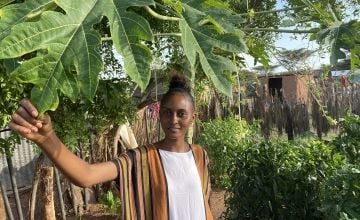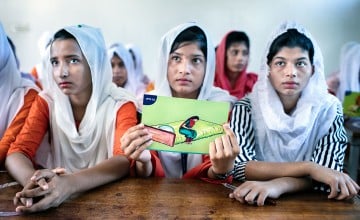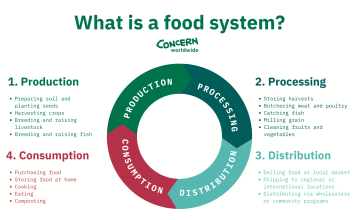
Read our 2024 annual report

Knowledge Hub
This essay is adapted from the 2023 Global Hunger Index essay, “Beyond 2030: Youth, Food Systems, and a Future of Food Sovereignty,” written by Wendy Geza and Mendy Ndlovu (Centre for Transformative Agricultural and Food Systems at the University of KwaZulu-Natal’s School of Agricultural, Earth, and Environmental Sciences).
We’re currently experiencing a global youth boom: Of the world’s 8 billion people, young people ages 15 to 35 make up 15% of the population. The 1.2 billion people entering adulthood form the largest youth boom in history, with many of these young people living in low-and middle-income countries in Africa, East Asia, and South Asia.
However, we’re also currently experiencing a global hunger crisis: The world produces enough food to feed all of its 8 billion people, yet 828 million people — roughly one in ten — go hungry every day.
These two facts are not as unrelated as you may think. Global food systems are outdated, unsustainable, vulnerable, and often lack inclusivity and equity — especially for young people entering adulthood. Here’s what that means, what needs to be changed, and how we can change it.
How the failing global food systems affect a key tool in ending world hunger
At the most basic level, the current food systems are not providing all of the world’s 8 billion-plus residents with enough food, even though we produce enough to do so. This is especially true in south Asia, east Asia, and Africa south of the Sahara Desert, where food insecurity and malnutrition rates are highest. Many of these countries are also among those that are most affected by climate change. These are also the areas of the world with the largest proportions of young people.
Many of the causes of hunger (including climate change, the intensive capitalisation of food systems, poor governance, and political instability) threaten a key tool to ending world hunger: food sovereignty. The Declaration of Nyéléni defines food sovereignty as “the right of peoples to healthy and culturally-appropriate food, produced through ecologically sound and sustainable methods, and their right to define their own food and agriculture system.”
In low- and middle-income countries, the loss of food sovereignty has reduced indigenous and local farming knowledge, and created local food systems that seem doomed to fail.

Youth are opting out of, or being excluded from, their local food systems
This is where the youth boom in countries with high rates of hunger comes in. With food systems broken and food sovereignty erased, there are rising opportunities for young people to work in their countries’ agricultural sectors. These are also some of the easiest jobs to get, as they don’t require people to come from wealth or have advanced degrees. However, for this reason, many young people see farming and other agricultural jobs as a “last resort,” according to one 2014 report.
People on the brink of adulthood in 2023 have been raised to understand that agriculture is a career with limited options and won’t offer them much in terms of money or self-realization. Their local agricultural systems are also under-supported and aren’t generally open to innovation or new ideas. A 2021 report reveals that, in many African countries south of the Sahara, the number of hours young people spend working in agriculture has declined to the point that many are opting out entirely.
Many of these countries’ economies rely heavily on agriculture, setting up another “doomed to fail” situation. With limited options for livelihoods, food security, and food sovereignty, young people stand to suffer the consequences of these same broken systems for years to come.

Young people are at the forefront of climate justice — and should be in the same place for food sovereignty…
Much like the effects of climate change the challenges with failing food systems are only expected to increase in the future. In fact, many of these challenges will increase because of climate change. Like climate justice, the fight for food sovereignty is an enormous opportunity to engage youth in transforming food systems to become more sustainable, more just, and better able to supply the needs of all the world’s people — especially the most vulnerable.
Food sovereignty action is a process that involves coordination and cooperation with stakeholders at the community, local, and national level, as well as across generations. The energy and innovation that many young people are entering the workforce with are incredible assets for an inclusive and successful process.
Youth can help advance the realization of the right to food in several ways, including: transforming food systems to be more locally-focused, including reinstating indigenous and traditional cropping systems that are currently under threat, and cultivating indigenous and neglected crops to create more sustainable food systems.

…but their voices are not being heard
As we’ve seen with young people expressing the urgent need for climate action, their voices are not always heard. Engaging them meaningfully in the food sovereignty process will be easier said than done, especially as there aren’t enough youth involved in decision-making processes.
Globally, representation of people aged 30 or under at the parliamentary level is negligible, especially for women and especially across Africa and Asia. Without representation at the legislative level (the average age of members of parliament around the world is at least 50), the specific needs of younger generations won’t be considered.

Leaders are beginning to tap into the youth boom
Many people recognize this needs to change: Some policymakers have begun to seek out these voices and perspectives proactively, via workshops, conferences, and working groups. Young people themselves are forming their own organizations and initiatives, reshaping perceptions of global challenges and innovation, while also demonstrating how much they’d like to be part of the solution. Leaders at all levels have a moral and economic imperative to tap into young people’s energy, creativity, and dynamism to transform food systems.
The right to food is increasingly recognized: In 2021, a United Nations committee passed a draft codifying the right to food in an almost unanimous vote (180 to 2). A shift towards food sovereignty will allow people to realize that right in a socially, culturally, and ecologically conscious way.
What needs to happen next
We know where we are, where we need to be, and how we might get there. Leaders must continue to support the youth movement in ending hunger and gaining food sovereignty, especially through securing funding for sectors that can improve the well-being of young people: health, education, skills development, and social connectivity.
Quality agricultural education is an especially key investment: It not only enables youth to become more productive and employable, but it will also serve as foundations for personal development and well-being. This would also help to develop career paths that young people will be encouraged and excited to pursue, including positions designed to drive agricultural transformation outside of farms, including improving local markets and promoting environmental sustainability.
To develop youth-inclusive and youth-specific policies, policymakers also need timely, reliable data on the current roles young people hold in food systems activities and policy processes. This will help to understand the conditions, capacities, and opportunities youth face in different regions — including intersectional issues like gender and ability — so that they can be empowered as agents of change.

Beyond 2030
We are now seven years away from the Sustainable Development Goals target of 2030, and while we’ve made progress, we aren’t likely to reach goals like Zero Hunger. For the world’s youth, this perspective is too shortsighted. Young people are looking much further ahead in a century increasingly shaped by dysfunctional food systems and protracted crises.
They are also entitled to expect a long and healthy future. As heirs to current food systems, they deserve a stronger voice in transforming them in order to meet the current and future needs. Advocating for social justice, promoting gender equality, spurring climate change action, gaining a voice at the policy-making table, and protecting every human’s right to food are some of the ways that the next generation is poised to transform our food systems — and our world.




